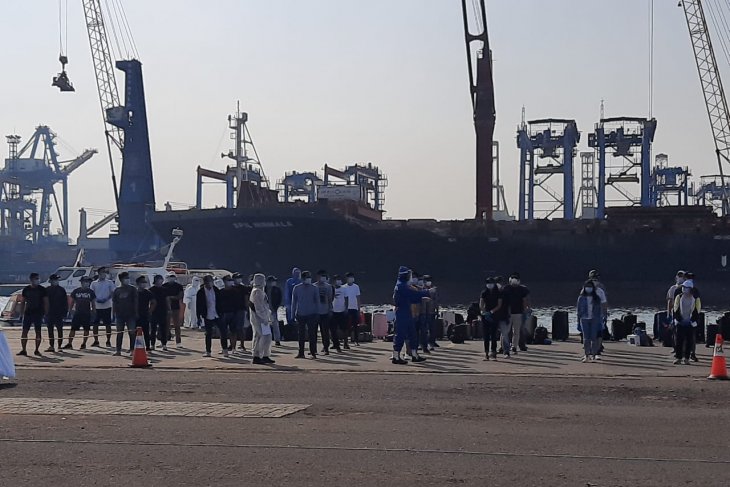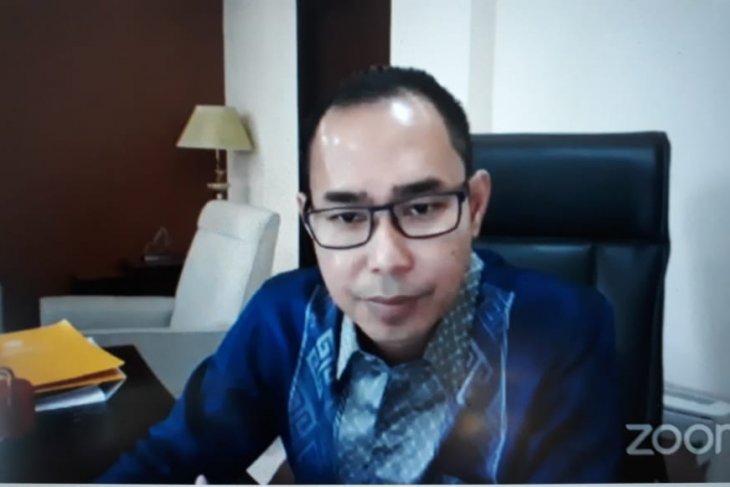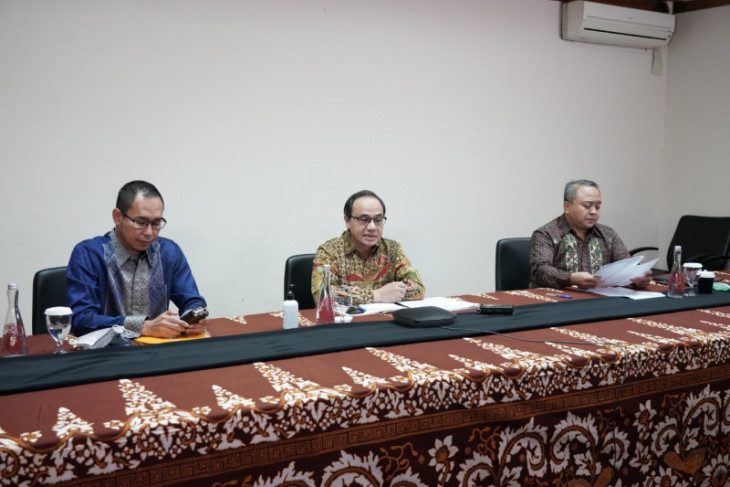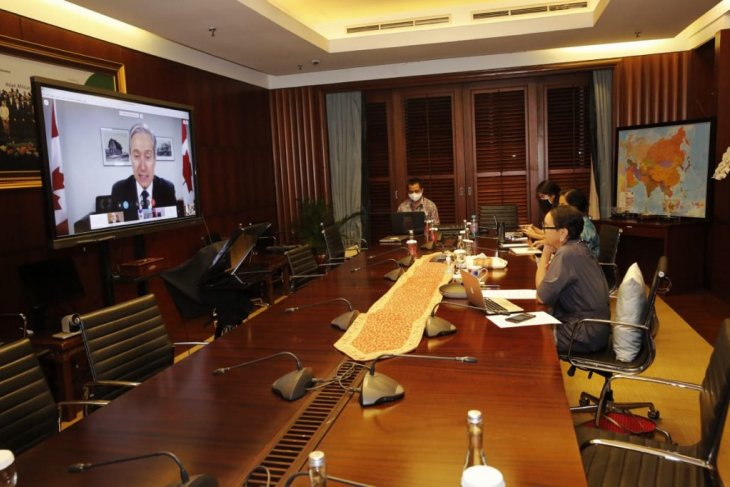Live Streaming
Program Highlight
Company Profile

Ani Hasanah
June

Hundreds of Indonesian crew members of the MS Island Princess cruise ship arrived at the Tanjung Priok Harbour in Jakarta on Wednesday (June 10, 2020). (ANTARA/HO-Navy Command I Fleet Document)
A total of 241 Indonesian crew members of the MS Island Princess cruise ship arrived at the Tanjung Priok Port, North Jakarta, on Wednesday.
The crew members were transported from the cruise ship to the dock with the help of four connecting vessels with a capacity of 40 passengers each.
Their disembarkation was carried out by a task force team, in accordance with the health protocols. The ship’s crew and their luggage was sprayed with disinfectant liquid as soon as they arrived at the dock.
Their belongings were also scanned using X-rays at the Customs and Military Police Base, Navy AL III / Jakarta.
Commander of the Indonesian Navy Base III, Brigadier General Hermanto, who served as the task force’s commander, said the crew will be taken to the Pullman Central Park Hotel in Jakarta, where they will also undergo COVID-19 testing.
"If there are any (test) results that come back positive, the (concerned) ship crew members will be taken to the Athlete's Village Emergency Hospital in Kemayoran, Jakarta," Hermanto said in a statement received in Jakarta on Wednesday.
The crew will also be required to undergo independent isolation for three to four days, provided that each person occupies one hotel room, he informed. The crew will then continue the independent isolation in their hometowns, he added.
The Bermuda-flagged MS Island Princess cruise ship sailed from Cape Town, South Africa, to Jakarta to complete the permit, Hermanto stated.
The cruise ship, which operates out of Great Britain and the United States, will dock in Jakarta for five days, before continuing its voyage to Manila, Philippines.
The return of 241 Indonesian crew members of the MS Island Princess cruise ship was the 13th such disembarkation overseen by the Navy's Fleet Command I Task Force in Jakarta.
Earlier, on June 8, 2020, the Jakarta Fleet Command Task Force had helped 343 Indonesian crew members disembark from the MV Rotterdam cruise ship at the same location. It was the 12th ship from which Indonesians were repatriated by the task force.
So far, a total of 3,402 Indonesian crew members have been repatriated to Jakarta, and the number is expected to increase until the COVID-19 pandemic ends.
The stakeholders involved in the repatriation efforts include the National Military Force, Police Force, the Ministry of Maritime Affairs and Fisheries, immigration officers, port authorities, and Customs officials.(ANTARA)
June

Director for the Protection of Citizens and Legal Entities Overseas at the Foreign Ministry, Judha Nugraha. (ANTARA
A moratorium on the recruitment of Indonesian seafarers on foreign fishing ships would only serve as a short-term solution to the problem of forced labor at sea, a Foreign Ministry official said.
"The moratorium will not automatically stop the practice. As a short-term solution, it (moratorium) can be done," Judha Nugraha, director for the Protection of Citizens and Legal Entities Overseas at the Foreign Ministry, said at an online discussion on illegal activities in the fishery industry, held in Jakarta on Wednesday.
According to Nugraha, the main challenge for the country is the illegal recruitment of migrant workers.
He cited the moratorium on migrant workers obtaining work in the Middle East as an instance where in spite of a ban, workers were still moving out for employment illegally.
"Moratorium is one option, but it is not the only option. The root of the problem is far more complex than this," he observed.
Nugraha highlighted some cases where the contract between sailors and employers did not specify protection for Indonesian crewmen.
For instance, he said, there were no fixed working hours for the crew, and the skipper had complete authority to decide them. Some sailors disclosed that they worked for a minimum of 18 hours per day, he added.
"There is a need to have standards and protections (laid down) in making the work contract," he averred.
Nugraha said all Indonesian embassies and representatives abroad have a 24/7 hotline service, and that number can be obtained on the Safetravel application.
National Coordinator for the Indonesian Destructive Fishing Watch (DFW), Moh Abdi Suhufan, has warned that human trafficking is just the tip of the iceberg and a serious crime that has continued plague the fisheries industry.
Support from all parties would be needed “to encourage a multidoors solution, among others, through multidoors law enforcement and management”, Suhufan said.
He urged the police to thoroughly investigate cases of human trafficking and forced labor involving Indonesian crewmen working on foreign ships.
The government, he said, would need to take strategic measures, including improvement of management, working conditions at sea, competence and law enforcement, and access to technology for victims so they can file reports. (ANTARA)
June

A press conference by the Indonesian Foreign Affairs Ministry's Spokesman Teuku Faizasyah (center), and Middle East Director Achmad Rizal Purnama (right). ANTARA
Indonesia appealed to the international community to oppose Israel's planned annexation of Palestinian territories since it endangers the stability and security of the region and deviates from a two-state solution to end the prolonged conflict.
"On several occasions, Indonesia, as emphasized by Foreign Minister (Retno Marsudi), has strongly condemned and rejected Israel's plan to annex the West Bank in the Palestinian territories," Foreign Ministry’s spokesman, Teuku Faizasyah, stated during a virtual press conference in Jakarta on Wednesday.
Foreign Minister Marsudi also sent letters to 30 nations in a bid to draw their attention to take a stand and reject the Palestinian annexation plan.
Five or six foreign ministers have responded to Indonesia's initiative to reject the annexation plan that is against various UN resolutions and international laws, according to the ministry's Middle East Director Achmad Rizal Purnama.
"The foreign minister (Marsudi) has invited these countries to prevent the annexation, and if it happens, how that action can be responded to in accordance with the international law," Purnama remarked.
On Wednesday at around 6 p.m. Western Indonesian Standard Time (WIB), Foreign Minister Marsudi will also partake in a virtual meeting of the Organization of Islamic Cooperation (OIC) countries to discuss Israel's plan to annex the Palestinian territories. Discussions at the meeting will center on the current situation in Palestine, specifically Israel's plan to annex parts of the West Bank, Palestine, after an agreement to form a coalition government between Benjamin Netanyahu and General Benny Gantz.
During the meeting, Foreign Minister Marsudi will express the Indonesian government's views on the issue in addition to proposals on concrete steps that the OIC should contemplate on to avert Israel’s planned annexation.
The OIC foreign ministers are expected to issue a resolution at the end of the meeting.
The resolution will encompass lending encouragement to all OIC member states to take political, legal, and economic steps in response to Israel's planned annexation of Palestinian territories.
Indonesia, a firm supporter of Palestine's struggle for independence, has no diplomatic ties with Israel as Indonesia's Constitution has highlighted the nation's anti-colonialism policy.(ANTARA)
June

Foreign Minister Retno Marsudi attends a virtual meeting of the Ministerial Coordination Group on COVID-19 (MCGC) on Tuesday (June 9, 2020) (ANTARA)
Indonesian Foreign Affairs Minister Retno Marsudi stressed on the importance of collaborative efforts between countries for vaccine development at a recent meeting of the Ministerial Coordination Group on COVID-19 (MCGC).
The virtual meeting, held on Tuesday (June 9, 2020), focused on ‘The Importance of Vaccine Development to Fight COVID-19 Pandemic’, and was attended by representatives from Indonesia, Singapore, the Philippines, the Republic of Korea, Australia, Canada, Peru, and Morocco.
Stressing on the need for creating a fair mechanism based on scientific studies, in the context of vaccine distribution, Foreign Minister Marsudi said once vaccines are found, special attention needs to be accorded to certain countries that do not enjoy equal access to vaccines.
The same applies to the considerations towards the risk of re-spreading the virus in countries which don’t have access to vaccines, she added.
She then underlined the need to ensure there is knowledge transfer from vaccine producers to countries to achieve a smooth increase in production capacity, including adjustments to the rules on Trade Related Intellectual Property Rights (TRIPs) as well as patent rights policies on social responsibility.
"Flexibility in intellectual property rules, including arrangements in TRIPs, are needed to encourage the development of affordable vaccines. The patent policy must consider social responsibility, especially in a pandemic situation, " she said in a statement received in Jakarta on Wednesday.
She also urged greater international cooperation for vaccine development and production, as well as synergies at the national and international levels, adding that "politicization of vaccines must be avoided”.
Marsudi explained that Indonesia has already formed a national consortium with a multi-stakeholder partnership and a national vaccine review team as part of efforts to accelerate vaccine development.
In addition, Indonesia is currently exploring potential cooperation with a number of international partners on the use of DNA and inactive virus platforms. The country has also invited collaborative partnerships from other international partners to mitigate the impact of the pandemic.
"We strongly encourage global collaboration — from manufacturing, research, and other (efforts) from stakeholders — to accelerate the development of COVID-19 vaccines," the minister remarked.
The MCGC meeting is a ministerial level meeting which is held periodically as a form of international cooperation on handling the COVID-19 pandemic, and it is expected to strengthen inclusive cooperation, trust between countries, and the spirit of multilateralism in facing challenges amid the pandemic. (ANTARA)

